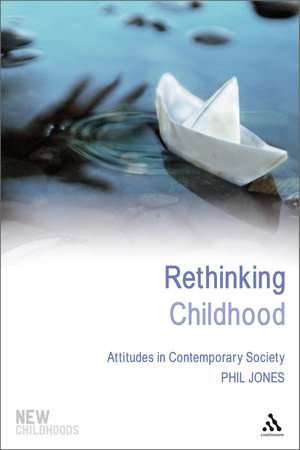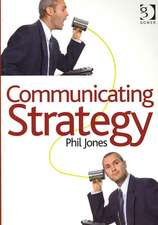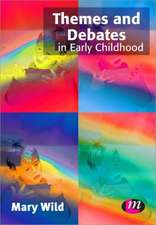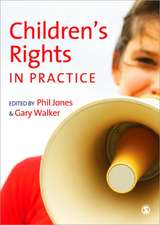Rethinking Childhood: Attitudes in Contemporary Society: New Childhoods
Autor Dr Phil Jonesen Limba Engleză Paperback – 6 mar 2009
Rethinking Childhood examines attitudes towards, and experiences of, childhood. Focus is placed on opposing the processes by which children are made to be 'other': the ways in which children are separated and segregated by adults.
Phil Jones explores different aspects of childhood: from education to health, from national policies to home life. A wide range of thought, research and practice from different fields and countries is used to debate, challenge and re-appraise long held beliefs, attitudes and ways of working and living with children. Children's own perspectives on their lives and on adults' attitudes towards them are drawn on throughout the book.
The result is a wide-ranging invitation to the reader to become aware of current perspectives on children and childhood, to develop a critical relationship with the content, and to develop their own 'reading' of childhood.
Each chapter contains examples of research, reflections on research, activities, key points and guidance on further reading.
Areas include:
-How is childhood changing?
-What is research revealing about attitudes towards children?
-Do adults encourage the idea of children as incapable and incompetent?
-How do adults fear for, and their fears of, children affect children's lives?
-How does the media affect children's lives?
-How does a child rights perspective challenge service provision?
-In what ways are children's voices and opinions changing our world?
Rethinking Childhood is essential for those studying childhood at undergraduate and graduate level and for those working with children in any field, from education to health, from play to law.
Phil Jones explores different aspects of childhood: from education to health, from national policies to home life. A wide range of thought, research and practice from different fields and countries is used to debate, challenge and re-appraise long held beliefs, attitudes and ways of working and living with children. Children's own perspectives on their lives and on adults' attitudes towards them are drawn on throughout the book.
The result is a wide-ranging invitation to the reader to become aware of current perspectives on children and childhood, to develop a critical relationship with the content, and to develop their own 'reading' of childhood.
Each chapter contains examples of research, reflections on research, activities, key points and guidance on further reading.
Areas include:
-How is childhood changing?
-What is research revealing about attitudes towards children?
-Do adults encourage the idea of children as incapable and incompetent?
-How do adults fear for, and their fears of, children affect children's lives?
-How does the media affect children's lives?
-How does a child rights perspective challenge service provision?
-In what ways are children's voices and opinions changing our world?
Rethinking Childhood is essential for those studying childhood at undergraduate and graduate level and for those working with children in any field, from education to health, from play to law.
Preț: 263.18 lei
Preț vechi: 302.45 lei
-13% Nou
Puncte Express: 395
Preț estimativ în valută:
50.36€ • 52.71$ • 41.92£
50.36€ • 52.71$ • 41.92£
Carte tipărită la comandă
Livrare economică 31 martie-14 aprilie
Preluare comenzi: 021 569.72.76
Specificații
ISBN-13: 9780826499363
ISBN-10: 0826499368
Pagini: 208
Ilustrații: 15
Dimensiuni: 156 x 234 x 15 mm
Greutate: 0.32 kg
Editura: Bloomsbury Publishing
Colecția Continuum
Seria New Childhoods
Locul publicării:London, United Kingdom
ISBN-10: 0826499368
Pagini: 208
Ilustrații: 15
Dimensiuni: 156 x 234 x 15 mm
Greutate: 0.32 kg
Editura: Bloomsbury Publishing
Colecția Continuum
Seria New Childhoods
Locul publicării:London, United Kingdom
Caracteristici
The use of evidence and research to underpin and develop the chapters' themes offer new input from children and young people on topics such as adult-child and child-adult perceptions, experiences of family and community.
Cuprins
Introduction to New Childhoods series
Part 1 Debates, Dilemmas and Challenges: An introduction to attitudes towards children
Chapter 1 Introduction
Introduction and key questions
How is childhood changing?
What is research revealing about attitudes towards children?
What are the uses of looking at attitudes towards children? Summary
Part 2 An Interdisciplinary Overview of Recent Research and Scholarship
Chapter 2 What are Attitudes towards Children?
Introduction and key questions
Are children still seen and not heard?
Is childhood changing?
What are contemporary tensions in childhood?
What are emerging ideas about 'new childhoods'?
Summary
Chapter 3 How are Otherness and Childhood Connected?
Introduction and key questions
What does being 'other' mean?
Childish or childlike: are children the ultimate other?
Are children seen primarily in terms of not being adults?
How does children's otherness affect their lives?
Can othering be challenged?
Summary
Part 3 Implications for Children's Lives
Chapter 4 Incomplete Adults? Decision Making and Autonomy
Introduction and key questions
What is an incompetent child?
Do adults encourage the idea of children as incapable and incompetent?
What is a competent child?
Maturation, dependency and autonomy: old enough to make a decision?
Can children be trusted?
Children and adult power What are effective ways of recognizing children's capability?
Summary
Chapter 5 Babies, Barbies and Blues: Stereotyping and its challengers
Introduction and key questions
What are adult attitudes towards children's gender?
Why do adults pink and blue children? Babies and beyond
What is the impact of the ways adults try to gender children's worlds?
How do children respond to their gendered world?
How do they make their worlds in terms of gender and image?
What are the implications of research on living and working with children?
Summary
Chapter 6 Fear for children and Fear of Children: Protection and projection
Introduction and key questions
What are adult attitudes concerning fear for, and fear of children?
How do adult ideas and practices concerning our fear for children affect children's lives?
How can attitudes be challenged and changed?
Summary
Chapter 7 Unseen and Unheard or Seen and Heard?
Participation and exclusion
Introduction and key questions
How and why do adults make decisions that shape children's worlds for them?
What impact does adult decision making have on children's lives?
What ideas and practices concerning children's participation have been developed?
How has research explored the practice and impact of children's participation in decision making?
Summary
Chapter 8 Challenging Otherness: Child rights and the child's voice
Introduction and key questions
How can attitudes be challenged?
How can the child's voice be prioritized?
What does research reveal about children's voices and their impact?
Summary
References
Index
Part 1 Debates, Dilemmas and Challenges: An introduction to attitudes towards children
Chapter 1 Introduction
Introduction and key questions
How is childhood changing?
What is research revealing about attitudes towards children?
What are the uses of looking at attitudes towards children? Summary
Part 2 An Interdisciplinary Overview of Recent Research and Scholarship
Chapter 2 What are Attitudes towards Children?
Introduction and key questions
Are children still seen and not heard?
Is childhood changing?
What are contemporary tensions in childhood?
What are emerging ideas about 'new childhoods'?
Summary
Chapter 3 How are Otherness and Childhood Connected?
Introduction and key questions
What does being 'other' mean?
Childish or childlike: are children the ultimate other?
Are children seen primarily in terms of not being adults?
How does children's otherness affect their lives?
Can othering be challenged?
Summary
Part 3 Implications for Children's Lives
Chapter 4 Incomplete Adults? Decision Making and Autonomy
Introduction and key questions
What is an incompetent child?
Do adults encourage the idea of children as incapable and incompetent?
What is a competent child?
Maturation, dependency and autonomy: old enough to make a decision?
Can children be trusted?
Children and adult power What are effective ways of recognizing children's capability?
Summary
Chapter 5 Babies, Barbies and Blues: Stereotyping and its challengers
Introduction and key questions
What are adult attitudes towards children's gender?
Why do adults pink and blue children? Babies and beyond
What is the impact of the ways adults try to gender children's worlds?
How do children respond to their gendered world?
How do they make their worlds in terms of gender and image?
What are the implications of research on living and working with children?
Summary
Chapter 6 Fear for children and Fear of Children: Protection and projection
Introduction and key questions
What are adult attitudes concerning fear for, and fear of children?
How do adult ideas and practices concerning our fear for children affect children's lives?
How can attitudes be challenged and changed?
Summary
Chapter 7 Unseen and Unheard or Seen and Heard?
Participation and exclusion
Introduction and key questions
How and why do adults make decisions that shape children's worlds for them?
What impact does adult decision making have on children's lives?
What ideas and practices concerning children's participation have been developed?
How has research explored the practice and impact of children's participation in decision making?
Summary
Chapter 8 Challenging Otherness: Child rights and the child's voice
Introduction and key questions
How can attitudes be challenged?
How can the child's voice be prioritized?
What does research reveal about children's voices and their impact?
Summary
References
Index
Recenzii
'Phil Jones has produced a lucid and accessible account of the state of childhood today. Clearly explaining current theory and using contemporary examples, he traces how ideas about childhood have become so complex and contradictory and points to the ways that adults simultaneously fear and idealise children, conceptualising them as both innocent and dangerous. The book deserves to be well known, and well used, inside and outside academia... it is wonderful to have a text which is so clearly written and accessible'. Heather Montgomery, Open University, UK, Editor of Changing Childhoods
'A very welcome addition to the field of the 'new' sociology of childhood and critical childhood studies. It draws upon a range of recent research from around the globe, and is written in an accessible and highly engaging style. The questioning format throughout the text will help students, teachers and practitioners to interrogate their own attitudes in a challenging and constructive way'. Virginia Morrow, Institute of Education, University of London, UK, Co-Editor of Childhood: A Journal of Global Child Research
'Rethinking Childhood brilliantly illuminates the social construction of childhood. Phil Jones succeeds in synthesizing research and interviews with leading scholars along with his narrative, resulting in a thoughtful, fascinating account of the most important topics in childhood studies. Rethinking Childhood is a gem of an introduction to childhood studies, and will be a valuable text for undergraduate and graduate students. ' Dan Hart, Director of the Center for Children and Childhood Studies at Rutgers University, New Jersey, USA.
'A very welcome addition to the field of the 'new' sociology of childhood and critical childhood studies. It draws upon a range of recent research from around the globe, and is written in an accessible and highly engaging style. The questioning format throughout the text will help students, teachers and practitioners to interrogate their own attitudes in a challenging and constructive way'. Virginia Morrow, Institute of Education, University of London, UK, Co-Editor of Childhood: A Journal of Global Child Research
'Rethinking Childhood brilliantly illuminates the social construction of childhood. Phil Jones succeeds in synthesizing research and interviews with leading scholars along with his narrative, resulting in a thoughtful, fascinating account of the most important topics in childhood studies. Rethinking Childhood is a gem of an introduction to childhood studies, and will be a valuable text for undergraduate and graduate students. ' Dan Hart, Director of the Center for Children and Childhood Studies at Rutgers University, New Jersey, USA.
























